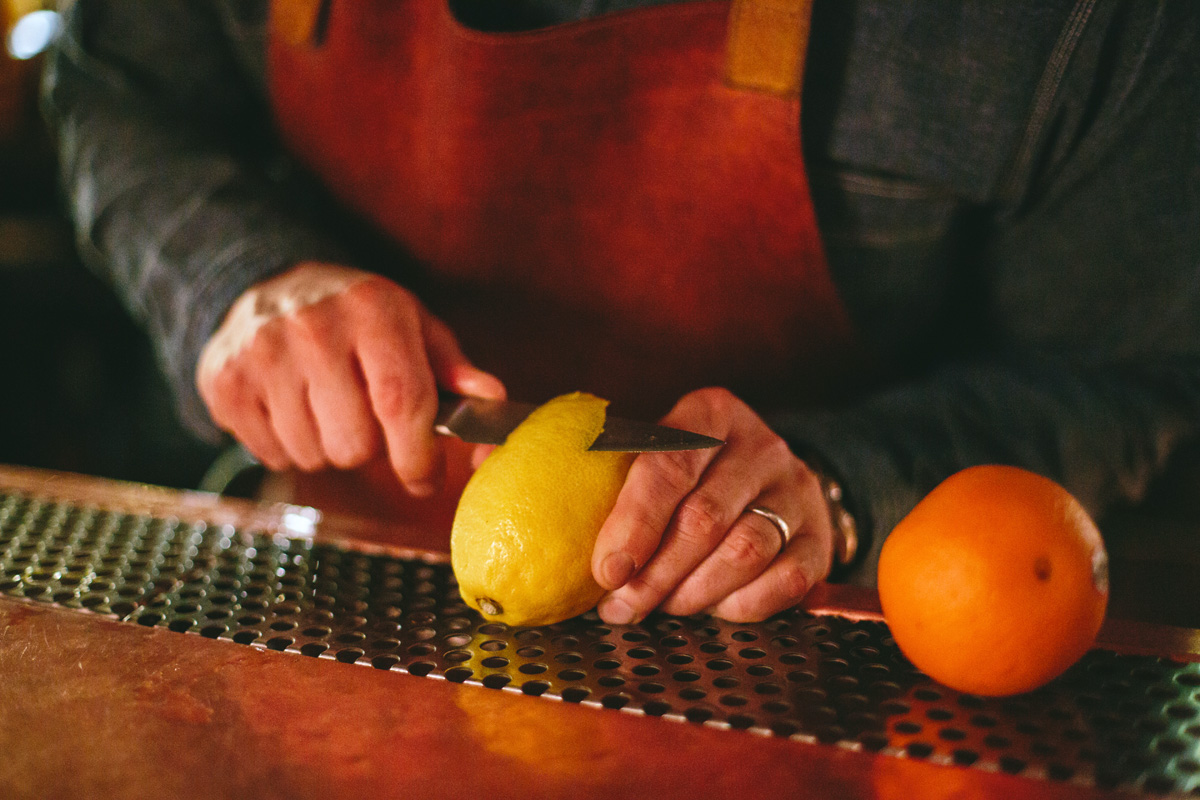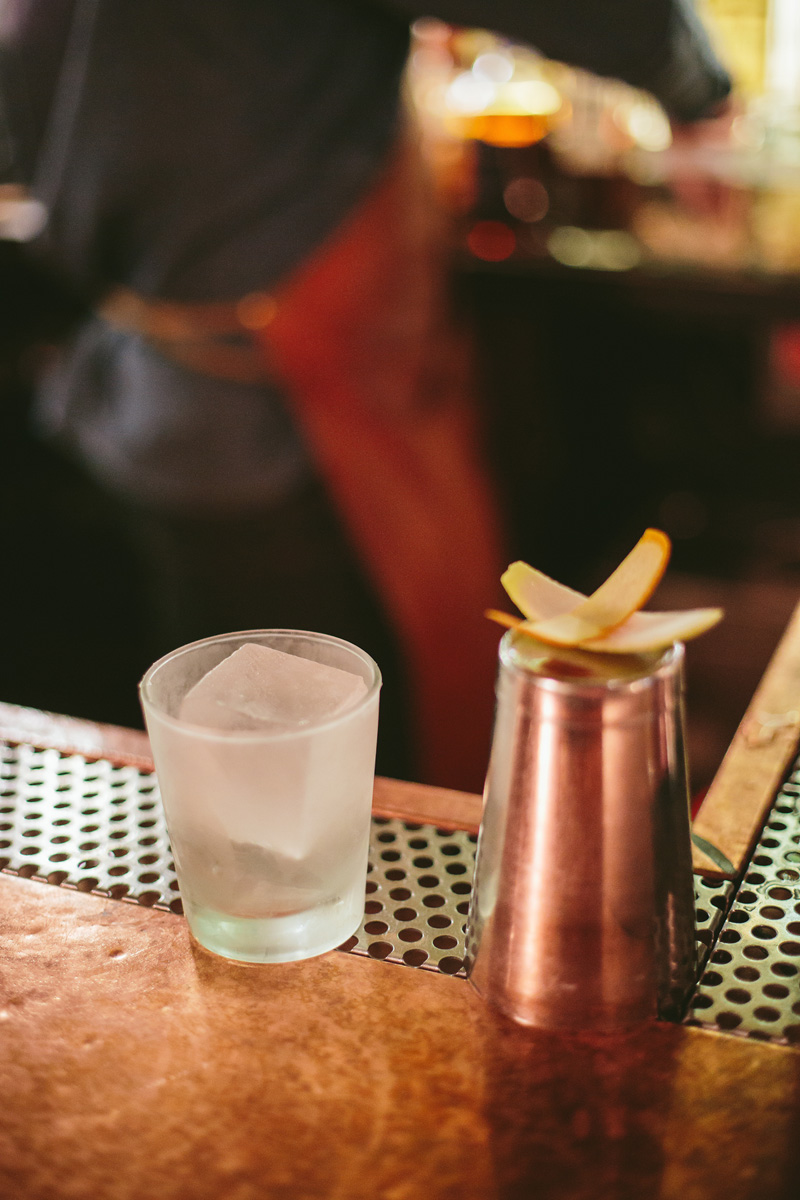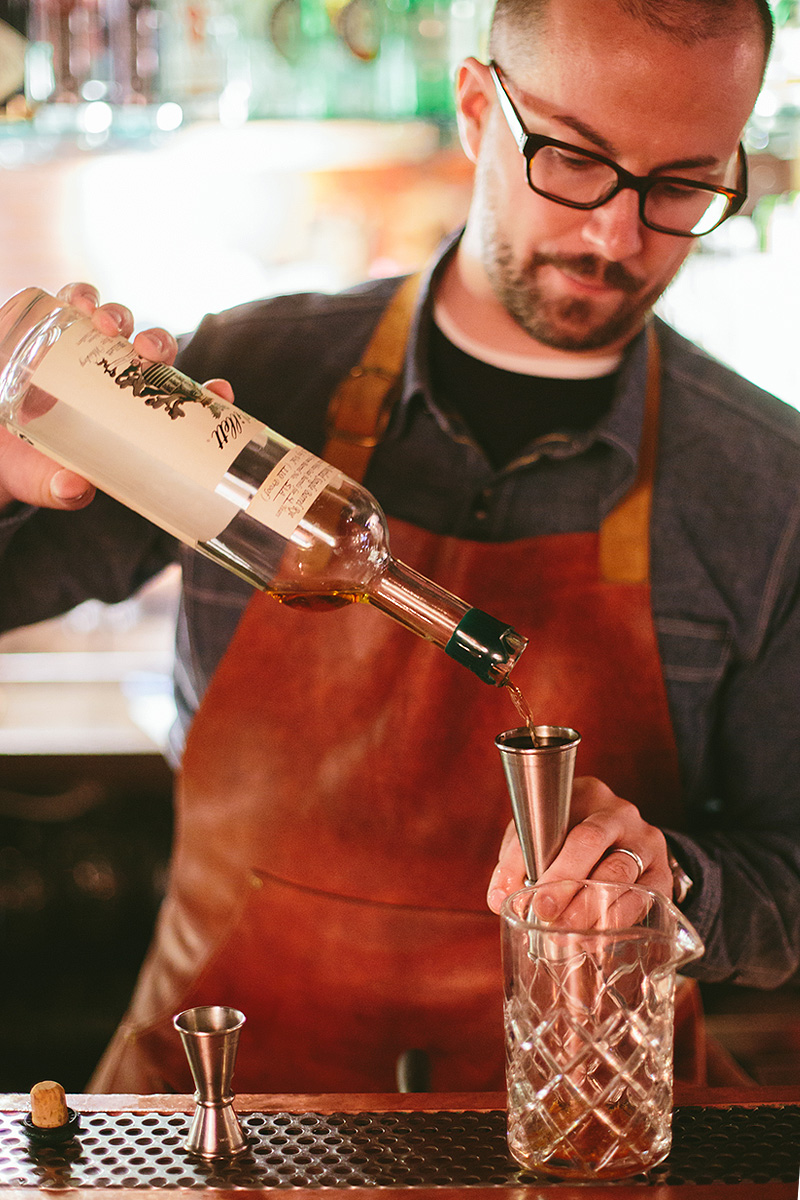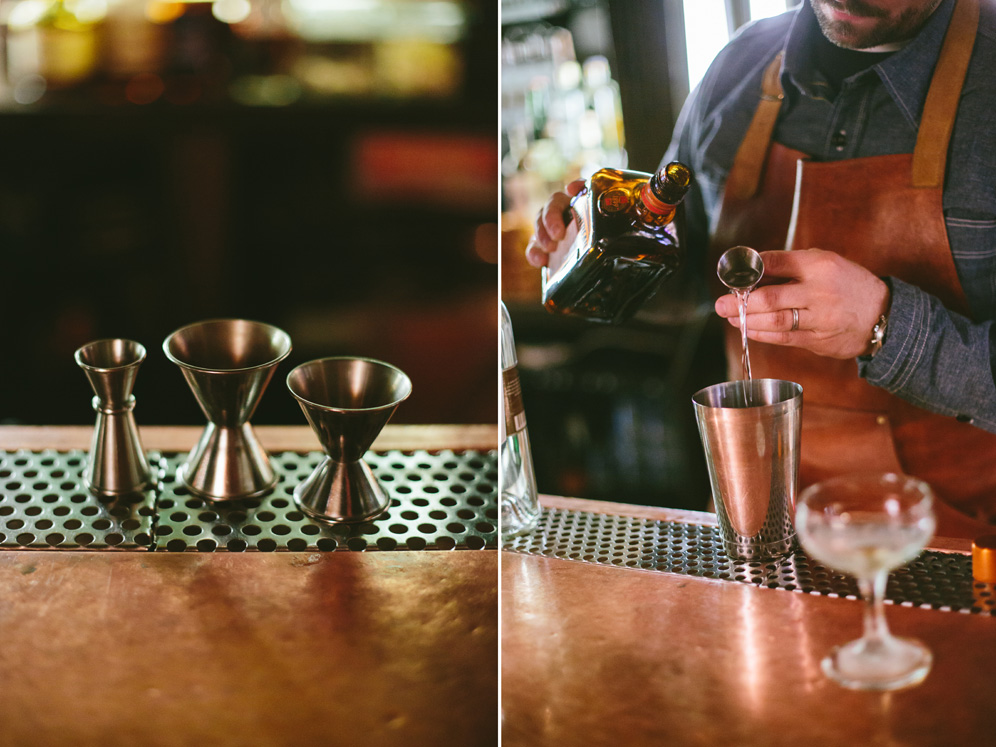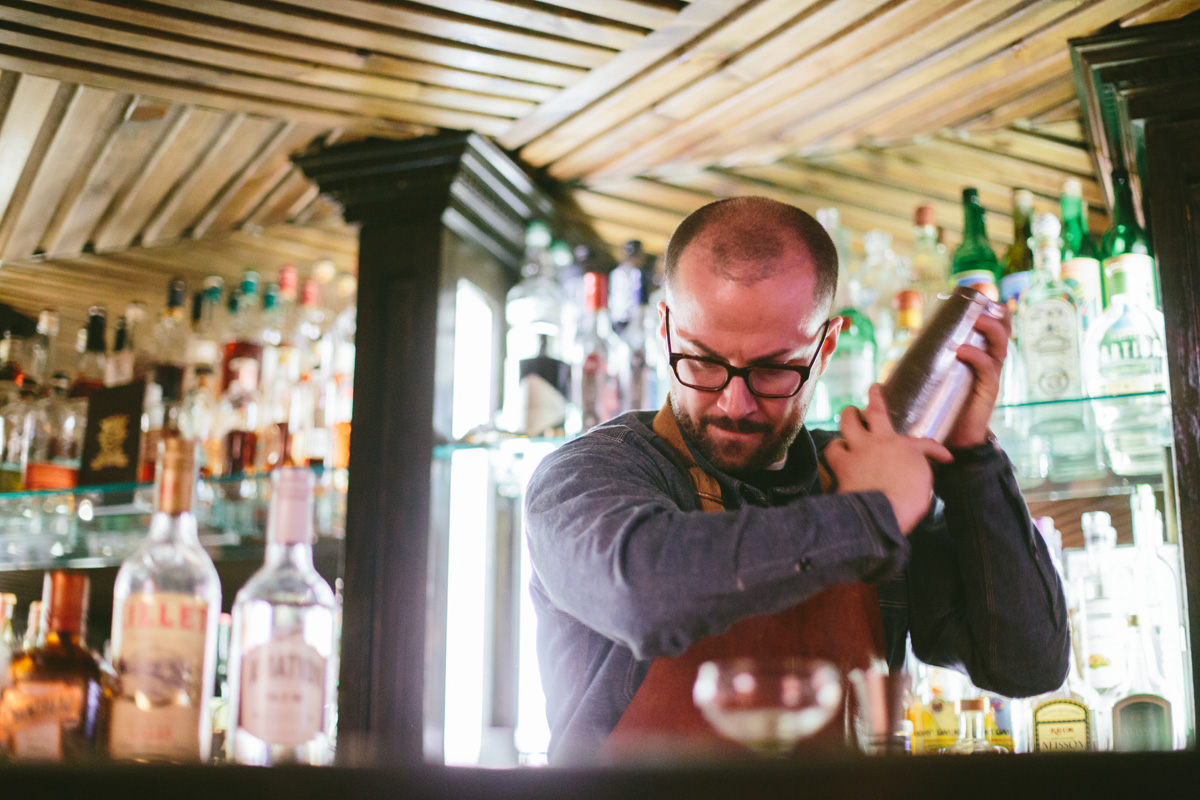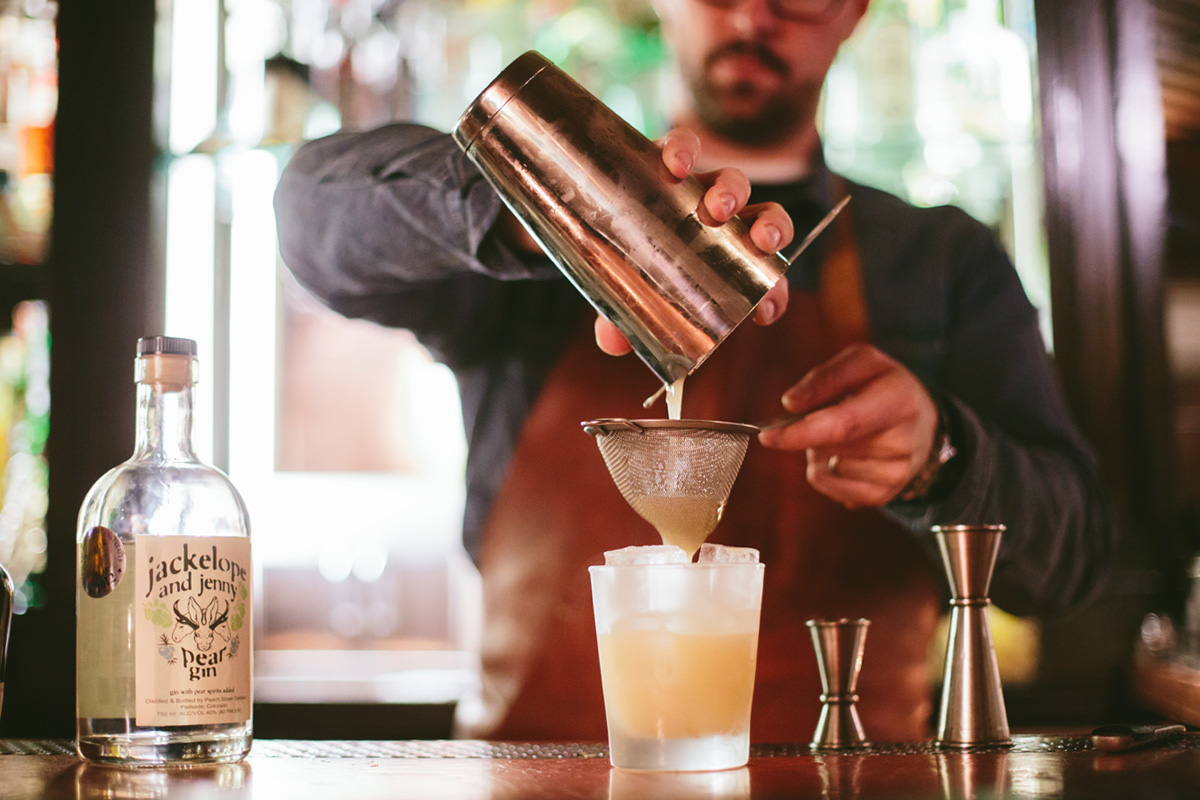Jim Meehan
Posted July 7, 2013
Interview by Andrew Chen
Photos by Minnow Park
PDT (short for Please Don’t Tell) is a bar in NYC’s East Village that happens to be tucked away behind a secret phone booth entrance in a hot dog joint. At its helm is Jim Meehan, who was initially brought on in 2007 as a consultant to develop the drink program but quickly grew into a partner. His foundations prior to joining PDT came from successful stints at Gramercy Tavern and Pegu Club, but it was in the small college town of Madison, Wisconsin where Jim first began bartending as a college student in 1995. Jim’s innovative cocktail recipes combined with unrelenting attention to customer service won PDT a James Beard award in 2012 (Outstanding Bar Program) and paved the way for regular writing opportunities with GQ, Food & Wine, Sommelier Journal, and more. We met Jim last year at Self Edge New York and discovered that the care and attention he gave to his craft carried over to the way he evaluated his responsibilities as a new father. Over this shared bond, a friendship was formed.
Last month, Jim graciously invited us to PDT one afternoon to join him as he developed new recipes for upcoming events. We got a chance to hear about his process for creating a new drink, what he values in his employees, and what makes for the perfect bar experience. Here are some of the things we learned.
-
Twitter
@mixography -
Instagram
@mixography -
Website
mixographyinc.com
Follow Jim

Some of the best innovations are born of necessity. Tell us a little bit more about why PDT has its secret entrance.
The space PDT inhabits was a failing bubble tea lounge before it was a bar. My partner, Crif Dogs’ founder Brian Shebairo, had a full liquor license but wasn’t harnessing its potential at his hot dog stand (where canned beer is king). Full liquor licenses are tough to obtain in neighborhoods like ours that are already filled with bars. He offered to take over his neighbor’s lease and when she finally agreed, he gutted the space and built a bar. In order to use the Crif Dogs liquor license in the bar space and avoid having to apply for a second license, he couldn’t use the street entrance to the old bubble tea lounge – so he cut a hole in the wall and chose a vintage phone booth as the portal between the spaces. While we have no signage, active Internet site or social media accounts, we’ve never tried to keep PDT a secret.
The perceived secret definitely adds to the draw but I’m sure people wouldn’t return if the drinks were bad, right?
Our hot dog menu, which we’ve partnered with neighborhood chefs to produce, and cocktails, which we develop seasonally in house, have been fundamental to our success – but warm, professional service is what keeps guests coming back. I’m biased, but I don’t think you’ll find a more creative selection of drinks in the city. With that said, the final evaluation of the products we offer remains in the hands of our guests, most of whose frame of reference varies greatly from mine. Most operators in New York City would agree that the quality of food and beverages, which we’re all free to buy, is a prerequisite; atmosphere and service are where the great places separate themselves from the rest.
Atmosphere and service are where the great places separate themselves from the rest.

And a big part of service, to me, is hospitality.
Hospitality is everything when you work in sales, especially in a bar or restaurant. We’re two blocks away from Death & Co., The Beagle, Amor y Amargo, Gin Palace, and a little more than three blocks away from Pouring Ribbons, Summit and Mayahuel. The cocktails at each of these bars are excellent, but the key point of difference between all these places is their style of service, interior design, and the people who work there. In the final analysis, staff is the key point of differentiation. I’m proud to say that after six years, I’ve never placed a help wanted ad and the people who work with me are some of the best in the business. I hire good people who were raised that way, and train them to be servers, hosts, barbacks and bartenders.

What’s one thing you’ve learned from your experience in opening PDT that you’d like to do differently in your next venture?
I wish there was just one thing. Fortunately, you tend to learn more from failure than success, and PDT has exceeded just about all my expectations. I’m not a builder, but when I open another bar I’m going to make sure to spend a lot more time and money on things like wiring, plumbing, refrigeration and HVAC. All the physical plant issues that come from operating a high traffic bar tend to take the joy – and a lot of the profit – out of the job. I find that so many operators (like us) were undercapitalized when they opened, and went over budget during the build out, forcing them to make sacrifices they pay for many times over because the job wasn’t done properly the first time. Measure twice, cut once.

What do you enjoy most about your job? What’s one thing that continues to be a struggle for you?
I’d say people would be the answer to both of those questions. Every week, I speak to salespeople, producers, colleagues from all over the world, the media, and more. There are very few professions that put you in intimate contact with such a wide variety of people from all walks of life. With that said, the sheer number of people I need to communicate with in order to keep all my commitments running smoothly can be daunting, and some of my largest struggles come from attempting, and failing sometimes, to keep everyone on the same page. Things fall apart in my business and life: I’m the one that needs to pick up the pieces and put them back in the right place. Communication is key.

How has the recent arrival of your daughter changed your perspective on work and home life?
As both a writer and operator of a bar without an office on premise, I spend a lot of time working from home. My wife has worked in restaurant management over the past few years, so we really haven’t seen much of each other recently; especially with all the traveling I do. After our daughter’s birth, we decided she would stay home full time with the baby. The combination of the cost of having a child and losing an income in such an expensive city to live in has affected the way I view work. Without sounding clichéd, I love what I do, so I’ve never really worried about the money. I’ve found that when you work hard, the money will follow. I’ve turned down a lot of opportunities in the last few years because they deviated from the path I thought I belonged on, or seemed risky. Now, I need to consider everything more closely. Ultimately, the sacrifices required to support a family are deeply gratifying in that there’s nothing better (in my opinion) than becoming a parent.
What’s one thing – either personally or professionally – that you’re working at improving on?
I’m a work in progress in just about every way: very process-oriented and always analyzing and evaluating myself. If I had to choose one thing I’m working on improving right now, it’s my life outside of work. I’m the type of person that dives into my work, and over the past decade in the city, I feel like the focus on my career has come at the expense of developing friendships, staying in shape physically, and honing other aspects of my life. I don’t know if I’ll ever be satisfied with myself, but I do feel that after more than a decade dedicated to drinks, it’s time to expand my horizons and spread my wings outside of work. I certainly want to spend more time with family than I have in years past.

What do you want your legacy to be?
I’ve always said that I’d rather be respected then liked. The older I get, the more I realize that I’d actually like both, but “no” defines you more than “yes” in my industry. In the end, I hope people understand that I tried very hard and did actually care what people thought of me. They say leadership is lonely: I couldn’t tell you who’s following me, but I will say that many of the good decisions I’ve made to distinguish myself in the industry isolated me… poor decisions alienated me even further from friends and colleagues. We all make mistakes, and I hope people don’t remember me for too many of mine.
